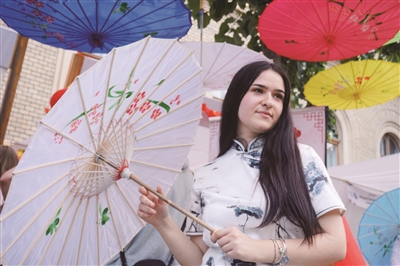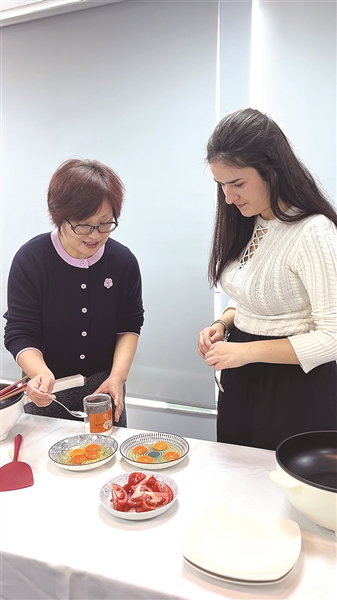
Photo provided to Hangzhoufeel

Andra was learning how to cook Hangzhou dishes from a local. Photo provided to Hangzhoufeel
By Daria Fominykh
“To move, to breathe, to fly, to float,
To gain all while you give,
To roam the roads of lands remote,
To travel is to live.”
--Hans Christian Andersen, The Fairy Tale of My Life: An Autobiography
Hans Christian Andersen’s fairy tales often unfold through a challenging yet rewarding journey, touching the hearts of readers along the way. Today’s heroine might remind you of such a childhood fairy tale, as she seems to have stepped right out of one herself.
Matei Elena-Andrada--or simply Andra--comes from Caracal in the southwest of Romania, a country best known to tourists for Transylvania, home to Bran Castle (often associated with Dracula), and the scenic Carpathian Mountains. What makes the 21-year-old international student’s story so charming is how Andra’s journey to China has naturally woven a great many connections between the Romanian and Chinese people.
Back in Romania, Andra would take one of her first Chinese friends to her grandparents’ rural home, strolling through the neighborhood and introducing them to real Romanian life. In Hangzhou, she easily befriended the owner of a Lanzhou noodle shop, sharing stories about Dracula and other lighthearted topics over bowls of steaming noodles each time she visited. Andra emphasizes that she loves the Chinese people and their culture. It seems that, in return, she has made Chinese people love Romania. How did this connection grow so strong?
Andra is in her final year of a Chinese Language and Literature bachelor’s degree at Universitatea Babeș-Bolyai in Romania, spending it as an exchange student at Zhejiang University of Science and Technology (ZUST) in Hangzhou.
“Actually, it goes way back to when I was 8 years old because I was attending kung fu classes, and my teacher, who was Italian but married to a Chinese woman, would teach us about Chinese culture, kung fu, history, and some Chinese words.” Years later, when choosing a university major, I recalled this experience and asked myself, ‘What if I started learning Chinese?’ And that’s how it all began,”Andra answered with delight--turning one of the most commonly asked questions for international students into a real and personal story.
As part of her studies, Andra took lessons at the Confucius Institute collaborating with ZUST. “We had some Chinese teachers, and I became really good friends with them. They encouraged me to participate in the Chinese Bridge language contest, winning which would be a great credit to securing an exchange year in China.”
Wearing a pastel pink dress in traditional Chinese style, with wavy dark brown hair falling over her shoulders, she gently holds the Chinese musical instrument hulusi, blowing the notes of its most famous melody--“Phoenix Tail Bamboo Under The Moonlight” (月光下的凤尾竹). Her upper body sways slightly, moving dreamily with the melody.
Hulusi is a traditional Chinese wind instrument made of gourd and bamboo and originating from ethnic minority groups of southwestern China in Yunnan Province. Andra taught herself to play it by watching videos on Bilibili and practicing for months every day after classes. The hulusi performance not only won her first trip to China in the summer of 2024 but also later a scholarship for her exchange year.
Language is, above all, a tool for connection, isn’t it? While learning the language and culture of China, Andra also shared Romanian culture by becoming an advisor for six Chinese exchange students from ZUST at her university in Romania.
Lin, one of those students who became Andra’s best friend and whom she later reunited with in Hangzhou, shared:
“I still remember stepping off the plane and spotting her right away, holding up a sign and looking for us. For most volunteers, helping us settle in would have been enough, but for Andra, it was just the beginning. She went beyond the basics, ensuring we truly experienced Romania. She took us shopping, led us on walks through parks and botanical gardens, and introduced us to local traditions. On Saint Nicholas Day, she surprised us by leaving treats and oranges in our slippers, just as Romanian families do for children. Before we left Romania, she gifted us Mărțișor, a red-and-white braided string exchanged in spring by Romanians to bring good luck.”
Andra has countless stories of the warm, nostalgic moments she shared with her Chinese friends, from celebrating New Year and Spring Festival in her small apartment, making Chinese dumplings and Sarmale (a traditional Romanian dish of cabbage or grape leaves stuffed with minced meat, rice, and spices), to introducing each other to their cultures in the most heartfelt ways. She carried that same spirit of connection with her to Hangzhou, continuing to weave together the cultures of Romania and China wherever she went.
“Last semester, we had a lot of events--maybe six or seven. At one of the events, every country contributed something--Indonesians performed a dance, people from Morocco and Egypt sang an Arabic song together, and I organized my Romanian team. That was beautiful!”Andra said.
Taking the lead, she gathered her fellow Romanians to perform Hora and Sârbă, traditional dances that are a staple at Romanian festivals, parties, and weddings. Once, Andra and her friends also brought a touch of nostalgia by performing Dragostea Din Tei, the iconic Romanian hit from the early 2000s, instantly recognized by its catchy “Ma-ia-hii, ma-ia-huu, ma-ia-hoo, ma-ia-haa”.
Andra’s stay in Hangzhou is just the beginning of her exciting journey of discovering China and the world. The fairy tale is only just beginning to unfold, slowly building toward its climax.
